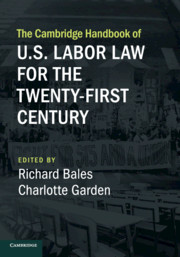Book contents
- Advance Praise for The Cambridge Handbook of U.S. Labor Law for the Twenty-First Century
- The Cambridge Handbook of U.S. Labor Law for the Twenty-First Century
- The Cambridge Handbook of U.S. Labor Law for the Twenty-First Century
- Copyright page
- Contents
- Contributors
- Preface
- Acknowledgments
- Part I Introduction
- Part II Labor Law Is Out of Date
- Part III The “Fissured” Workplace
- Part IV Barriers to Forming a Collective Bargaining Relationship
- Part V Barriers to Bargaining a Good Contract
- Part VI Unions, Civil Society, and Culture
- 28 Can Labor Law Reform Encourage Robust Economic Democracy?
- 29 Union Security for the Twenty-First Century
- 30 Union Membership and the Ghent System
- 31 Principled Hope
- 32 Politically Engaged Unionism
- 33 Union Commitment to Racial Diversity
- 34 The Economics of Minimum Wage Regulations
- 35 The Role of Labor Research and Education in the Labor Movement of the Twenty-First Century
34 - The Economics of Minimum Wage Regulations
from Part VI - Unions, Civil Society, and Culture
Published online by Cambridge University Press: 01 November 2019
- Advance Praise for The Cambridge Handbook of U.S. Labor Law for the Twenty-First Century
- The Cambridge Handbook of U.S. Labor Law for the Twenty-First Century
- The Cambridge Handbook of U.S. Labor Law for the Twenty-First Century
- Copyright page
- Contents
- Contributors
- Preface
- Acknowledgments
- Part I Introduction
- Part II Labor Law Is Out of Date
- Part III The “Fissured” Workplace
- Part IV Barriers to Forming a Collective Bargaining Relationship
- Part V Barriers to Bargaining a Good Contract
- Part VI Unions, Civil Society, and Culture
- 28 Can Labor Law Reform Encourage Robust Economic Democracy?
- 29 Union Security for the Twenty-First Century
- 30 Union Membership and the Ghent System
- 31 Principled Hope
- 32 Politically Engaged Unionism
- 33 Union Commitment to Racial Diversity
- 34 The Economics of Minimum Wage Regulations
- 35 The Role of Labor Research and Education in the Labor Movement of the Twenty-First Century
Summary
This chapter offers a brief review of some issues related to the economics of minimum wage regulations. More concretely, I will organize my discussion around two major headings: Why minimum wages? And what are the effects of minimum wages on employment, technological change, and inequality?
- Type
- Chapter
- Information
- Publisher: Cambridge University PressPrint publication year: 2019
- 1
- Cited by

